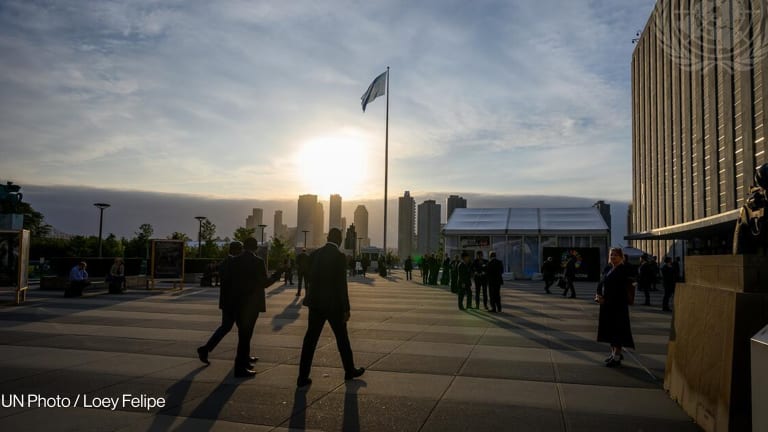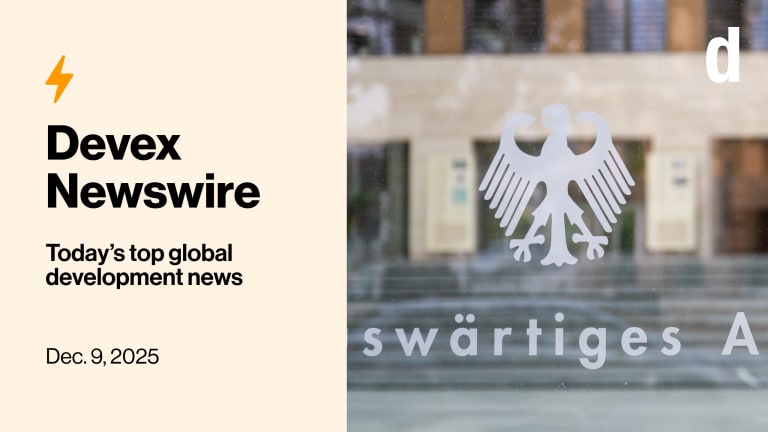
A panel of leaders appointed by the United Nations will propose on Friday a highly anticipated global blueprint for eradicating extreme poverty by 2030, and kick off a phase of intense lobbying and negotiations, which may affect international cooperation — and the delivery of foreign aid — for years to come.
The framework will push for the completion of the Millennium Development Goals, a set of anti-poverty goals meant to be reached by 2015. It will also seek to boost employment and achieve inclusive economic growth, while safeguarding the environment, promoting good governance, and advancing peace and democracy around the world.
The panel’s report, entitled “A New Global Partnership: Eradicate Poverty and Transform Economies Through Sustainable Development”, proposes 12 measurable goals and 54 targets for the international community to rally around to tackle the most pressing problems facing the world today.
Goals include ending extreme poverty for good, making sure everyone has access to food and water, promoting good government, and boosting jobs and growth. Devex has learned that recommended goals will be universal in character.
Targets associated with these goals include promoting free speech and the rule of law, ending child marriage, protecting property rights, encouraging entrepreneurship and educating all children to at least primary school level. These targets may be set either globally or at national and local levels, with a recommendation to disaggregate indicators according to factors such as income and social group, gender, location, age and persons with disabilities.
Key points
Highlights of the report include an emphasis on the following themes:
Ending poverty for good, eliminating preventable infant deaths and reducing maternal mortality to a maximum of 20 deaths per 1,000 live births.
Using jobs and growth as the means of climbing out of poverty, with a much greater focus on promoting business, trade, infrastructure, education and skills.
Good governance and transparency, building institutions and promoting free speech and the rule of law towards the creation of a more free and prosperous society.
Empowering girls and women, ending child marriage, eliminating all forms of violence against women and girls, and ensuring the equal right of women to own property and open a bank account.
Tackling conflict and instability, reducing violent deaths caused by conflict and criminality by addressing the leading “stressors” of conflict and building up the capability of police forces and judiciaries.
Bringing development and environmental agendas closer together, with targets on reducing food waste, slowing deforestation and protecting ecosystems and genetic diversity.
Global challenges, including food and energy shortages, climate change, and inequality faced by women and young people.
The release of the report is expected to set in motion a flurry of activity within the U.N. system, as well as governments and civil society around the world. The global aid community, in particular, is expected to lobby hard for specific targets to be included in a final post-2015 development blueprint, which will be a focal point for discussion at the United Nations General Assembly in September.
Global health advocates may be disappointed about the apparent omission of universal health coverage from the high-level report to be released on Friday. Others will meanwhile welcome the focus on reducing inequality and call for broad stakeholder engagement and partnership between the public, private and nonprofit sectors.
A work in progress
The 27 members of the panel — co-chaired by President Susilo Bambang Yudhoyono of Indonesia, President Ellen Johnson Sirleaf of Liberia, and Prime Minister David Cameron of the United Kingdom — were appointed by U.N. Secretary-General Ban Ki-moon in July 2012, tasked with advising him on a global development framework beyond 2015, the target date for the MDGs.
Over the past six months, the panel consulted a range of stakeholders, including those in the developing world, on their priorities. Initiatives such as The World We Want or My World, where citizens voted on their development priorities online, also fed into the drafting process.
These consultations — on top of meetings in London, Monrovia and Bali — led to the panel’s vision for global development: a transformative, people-centered and planet-sensitive post-2015 development agenda that ends extreme poverty and enables sustained prosperity for all.
The next steps include a number of briefing and discussion events, featuring HLP members and civil society stakeholders, including sessions in New York and Nairobi during the coming days. It is expected that such gatherings will provide the impetus for debate and negotiation on the development agenda supposed to succeed the current MDGs from 2015.
What the aid community wants
Ahead of the release of the report, prominent figures from the development aid community have been sharing their opinions on how the post-2015 agenda should be shaped. These comments are indicative of issues that will likely shape the debate in the days ahead.
The report attempts to tackle two challenges that have been at the top of the agenda for many advocates: the importance of reducing inequality and the need for practical, measurable and global goals. European Commissioner for Development Andris Piebalgs’ call for one set of goals and a simple architecture is also a cornerstone of the panel’s recommended framework.
Other issues that will be closely scrutinized include how the report addresses disaster risk management, raised by Yudhoyono and others, as well as women’s empowerment, an issue close to the heart of U.K. Secretary for International Development Justine Greening and many other leading figures.
Areas of the report that may not satisfy all parties, include calls for minimum standards for equal and quality learning by UNICEF Deputy Director Geeta Rao Gupta and others, or for a specific focus on education finance by people such as UNESCO Global Monitoring Report chief Pauline Rose.
Read more development aid news online, and subscribe to The Development Newswire to receive top international development headlines from the world’s leading donors, news sources and opinion leaders — emailed to you FREE every business day.








